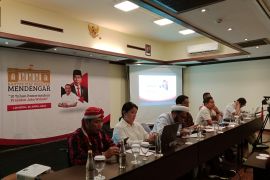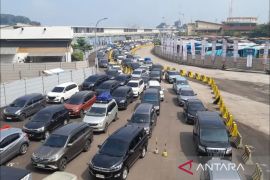The announcement came after Okky Assokawati, the House of Representatives Commission IX member from the United Development Party (PPP) faction, called on the government to immediately act on the problem, which has affected a number of provinces during the dry season and has sparked massive crop damage, water supply disruption and a slowdown in the countrys economic growth.
Officials also admitted that the El Nino-induced drought has caused acute respiratory tract infections (ISPA) among thousands of residents and has sparked forest fires in a number of provinces.
Agung Laksono, coordinating minister for peoples welfare, also announced that the government was working on improving the irrigation systems, dams and water sources of the drought-hit provinces.
In a press statement, Laksono admitted that drought had affected the provinces of East and West Nusa Tenggra, North Sulawesi, East and Central Java, Yogyakarta, West Java and North Sumatra.
But the minister stressed that the drought had affected only 129,000 of the countrys four million hectares of farmland and of these, only nine thousand hectares had experienced harvest failure.
"We call on the government, through its relevant institutions, to take preventive measures, to monitor and control the impacts of drought on public health," Assokawati said in a statement issued here last Wednesday.
The former ramp model also urged the government to ensure the availability of clean water and sanitation facilities for communities affected by the drought.
"We will continue to coordinate with relevant institutions to address the impact of the drought," Laksono said in response.
In her statement, Assokawati cited the environmental, economic and social repercussions of the drought and said the government should take these into consideration in its action plans.
According to her, the social consequences of drought include anxiety related to economic loss, health problems related to dust, scarcity and poor quality of water, and the threat to public safety arising from an increase in the number of forest fires.
She added that the effects of the drought could ripple through economic sectors, communities and the ecosystem, and urged the government to figure out why drought has created such effects and find ways to mitigate them.
Meanwhile, Environment Ministry spokesman Arief Yuwono revealed last Tuesday that several factors, including drought, have made nine provinces in Indonesia prone to forest fires.
The provinces are North and South Sumatra, Jambi and Riau, as well as West, East, Central, South, and North Kalimantan.
"Data has been collected on the nine provinces, which have taken preventive measures against forest fires," Arief stated.
Major forest fires occurred in Riau Province last year and are expected to occur in South Sumatra and Central Kalimantan this year, he added.
In the Lebak District of Banten province, hundreds of pumps were installed to transport ground water to rice fields for irrigation, in anticipation of a water shortage in the coming months.
In Sukabumi, West Java, the local disaster mitigation agency has categorized the drought affecting several parts of the district as an emergency alert status calamity.
"The alert status will last from September 8 to December 8," Usman Susilo, head of the agencys emergency and logistics section, said in Sukabumi said Thursday.
Susilo said the drought was affecting seven of 47 sub-districts in Sukabumi, making it difficult for residents to get clean water. The sub-districts are Purabaya, Pabuaran, Ciemas, Bantargadung and Cimanggu, all located in the southern part of the district.
The emergency alert status aims to speed up measures to deal with the drought, including providing clean water to residents in affected areas.
Irwan Fajar, head of the agency prevention and alertness section, said on Wednesday his office has asked each sub-district to report on the situation in their respective areas.
"We have been coordinating with the emergency and logistics section of the agency to follow up on a report from the drought-affected sub-district," Fajar said.
Drought has also affected 17 of the 22 districts and cities in East Nusa Tenggara (NTT) Province, the head of the provincial disaster mitigation office, Tini Thadeus, said last Sunday.
Tini revealed that the East Nusa Tenggara provincial administration has asked for Rp10 billion in aid from the central government to address drought in the province.(*)
Reporter: Otniel Tamindael
Editor: Heru Purwanto
Copyright © ANTARA 2014











